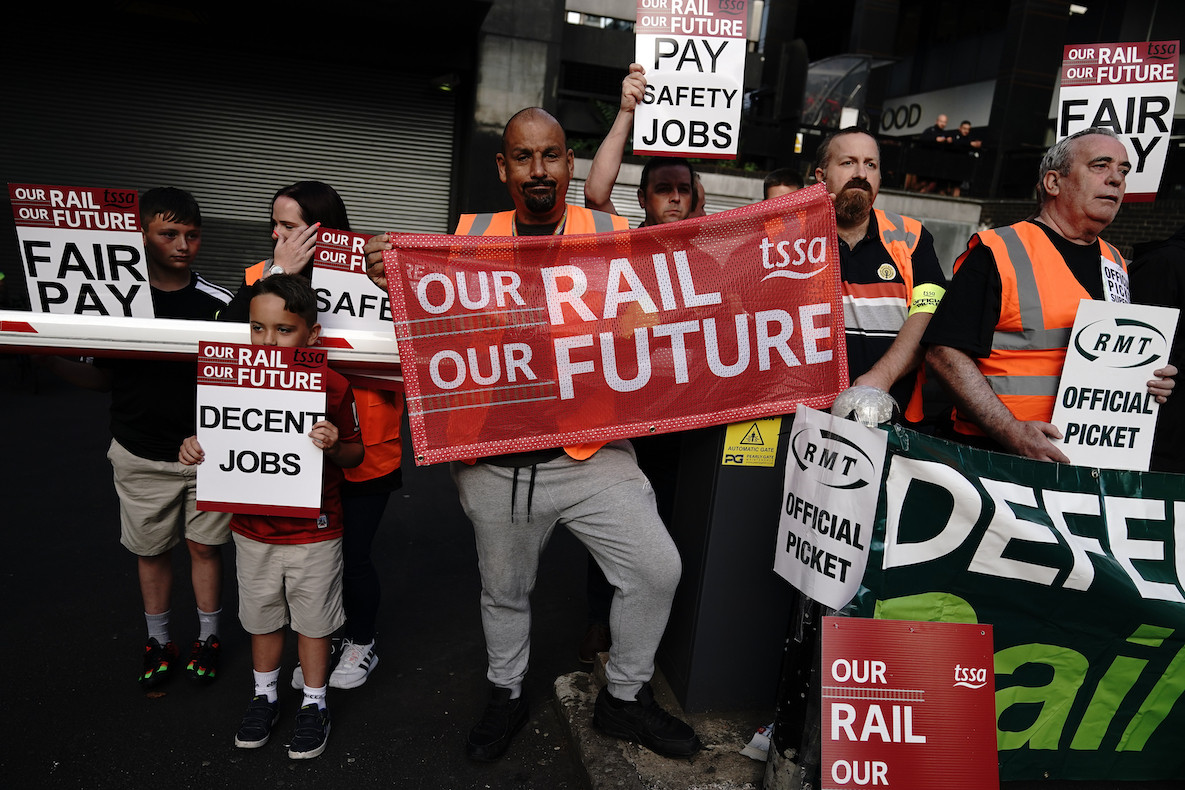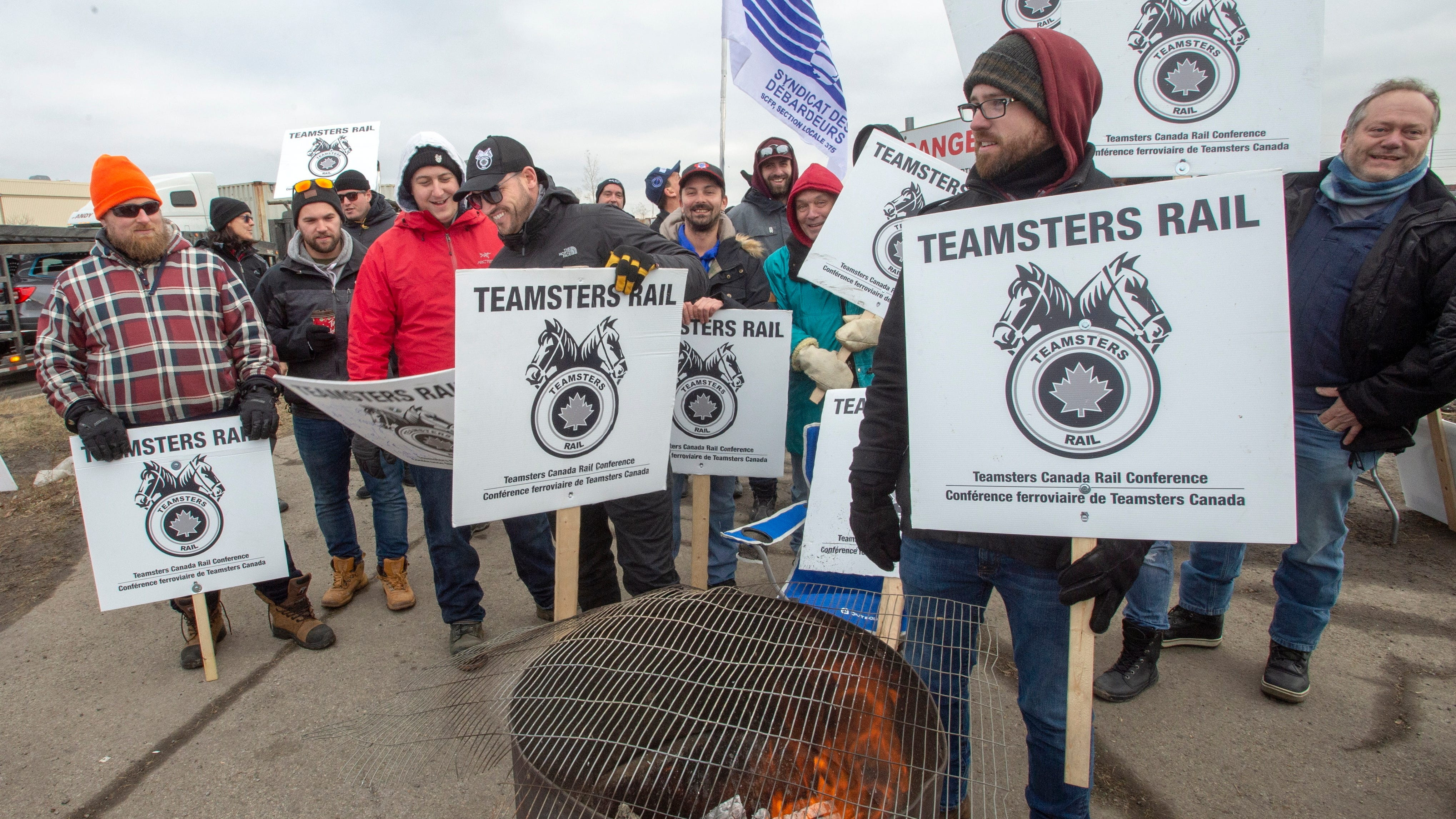A labour dispute between Canada’s two main national rail carriers and workers could lead to a possible lockout as soon as Thursday morning, threatening crucial supply chains across North America. Canadian National Railway (CN) and Canadian Pacific Kansas City (CPKC) plan to lock out nearly 9,300 workers as of 00:01 EST (04:01 GMT) failing an eleventh-hour deal. Negotiations have stalled over shift scheduling, fatigue provisions and wages.
Canada sends around 75% of all the goods it exports to the US, mostly over rail, and a prolonged dispute could disrupt shipments of a wide range of goods, from grains and beans to potash, coal and timber. On Wednesday, Prime Minister Justin Trudeau urged both sides to continue talks.
"Millions of Canadians, of workers, of farmers, of businesses right across the country are counting on both sides to do the work and get to a resolution," he said in brief remarks, without taking questions. Dozens of industry and trade organisations warned last week in an open letter that the disruption would have "an immediate impact" from coast-to-coast and damage Canada's reputation as a trading partner.
"Factoring in the millions of Canadian jobs that would be impacted, the magnitude of the disruption is daunting," it said. On Tuesday, a joint statement from the US and Canadian chambers of commerce warned of the potential "devastating" impact of the stoppage.
It "will be devastating to Canadian businesses and families and impose significant impacts on the US economy", they said. A group of agriculture trade associations has urged Ottawa to step in, but the government has declined so far.
Federal Labour Minister Steve MacKinnon is meeting both sides this week but has resisted calls for binding arbitration. Labour agreements for both railways expired at the end of last year. Both CPKC and CN have told the union they will begin locking out members on Thursday. Teamsters Canada Rail Conference separately issued a 72-hour strike notice to CPKC on Sunday.
Potential Impact on Businesses and Consumers
Rail networks in the US and Mexico will continue to operate but a stoppage north of the border could be felt across North America. On Monday, US Transport Secretary Pete Buttigieg said on X/Twitter that he is monitoring rail negotiations and the potential impact on the cross-border flow of goods. Some C$380bn (£214bn) in goods is moved by rail each year and railways move half of the country's goods for export, according to the Railway Association of Canada.
This week, both CPKC and CN have already begun pausing some shipments in preparation for a stoppage. Embargoes are now in place on chemicals such as ammonia, used as a fertiliser, and chlorine, used in water treatment, to avoid them being stranded on the rails if work stops. Shipping firm Maersk on Monday stopped accepting shipments destined for Canada meant to move by rail and that could not be transported on heavy trucks instead. The Canadian Pork Council warned that since the industry relies on rail to get feed to its animals, their welfare is at risk.
“Canada’s red meat processors need stable, reliable supply chains to run their businesses," said Chris White, CEO, Canadian Meat Council in a statement. "Interruption in service will result in millions of dollars in losses, irreversible reputational damage, environmental disposal challenges, and enormous waste.”
The Broader Implications
The shutdown could also snarl commuter transit in major Canadian cities like Toronto or Montreal as some dispatchers will be on a work stoppage. Professor Barry Prentice, director at the University of Manitoba Transport Institute, said the government would likely pass back-to-work legislation in the coming days if the sides couldn't come to an agreement, as has been done in similar past disputes.
"This isn't the best way to run the show," he told the BBC. "But it seems to be the playbook and and we're back on this merry-go-round again,"
The railroads stopped accepting new shipments of hazardous materials to ensure that none of those dangerous commodities would be stranded along the tracks if the railroads shut down. Shipments of perishable goods were also put on hold early. All other shipments are being gradually halted before Thursday. Depending on how many supplies they have on hand and how much storage space they have for finished products, some chemical plants may have to quickly start cutting production or even consider shutting down.
One key example is chlorine that is used to treat drinking water across Canada, all of which is shipped by rail, according to Greg Moffatt, executive vice president of the Chemistry Industry Association of Canada. Most water treatment plants have a 10-to-14-day supply of chlorine on hand. “The clock is ticking,” Moffatt said. “And there is no ability to move chlorine by truck.”
Even for chemicals that can be hauled by truck, it’s not practical. It would take at least three trucks to haul the same amount one rail tank car carries. Grain, fertilizer and most other bulk products such as timber, construction materials and coal all move by rail. Western Grain Elevators Association executive director Wade Sobkowich said the contract dispute is happening at a time when demand for Canadian grain is at its highest: About $50 million of grain moves every day.
“This isn’t just grain. This is forest products, this is automotive, this is coal, mine products. ... It’s going to have a huge impact to consumers in Canada and our customers around the world that need food ingredients,” he said. Ports rely on railroads to haul containers filled with all kinds of goods across the country after they are unloaded from massive ships. Trains haul about 60% of the cargo containers that come into the port, according to Port of Halifax spokesperson Lori MacLean.
“Canadian gateways have already seen a reduction of volumes due to the uncertainty around rail operations,” she said. The Vancouver Fraser Port Authority has told ships that are currently en route to slow down and delay their arrival time to prevent further congestion in the port. International shipping giant Maersk is making contingency plans but continues to ship goods into Canadian ports for now. There really isn’t any alternative to rail when it comes to moving large goods across North America, says Dennis Darby, president of Canadian Manufacturers and Exporters, the country’s largest trade and industry association.
Canada's Rail Dilemma: A Balancing Act
If the railroads shut down, the problems will reverberate throughout Canada and the U.S., Darby said. “We are all a part of the same supply chain,” he said. Trudeau is likely waiting to intervene until it looks like there is no other alternative because his Liberal Party doesn’t want to “alienate the labor movement,” said Daniel Béland, a political science professor at McGill University in Montreal.
“The politics are tough indeed ... Yet, as they recognize, the ongoing strike has a detrimental impact on the country as a whole,” he said. Both Canadian National and CPKC had proposed shifting away from a longstanding system in which train crews are paid based on the miles they travel, to a system based on the hours they work. The railroads said that would make it easier to give workers more predictable schedules. But the union resisted. It believes the change will erode schedule provisions designed to reduce fatigue that they have fought so hard for over the years.
“We don’t want to go backward and give concessions to very, very profitable companies that should be improving conditions,” union spokesman Christopher Monette said. In hopes of reaching a deal, CPKC dropped its proposal to use an hour-based pay system like that used in the United States, said railroad spokesperson Patrick Waldron. But a remaining sticking point is how much train crews should be paid when they are resting at a hotel on the road between trips. The railroads say they are making sure these new contracts reflect the latest Canadian rules, which require additional rest between trips.


















